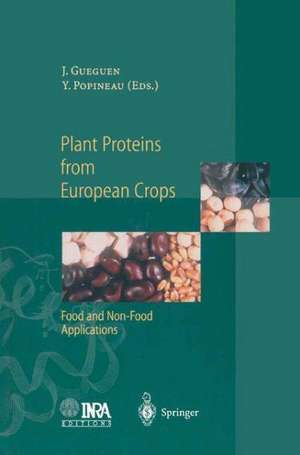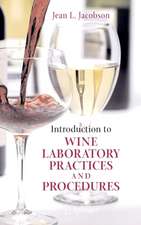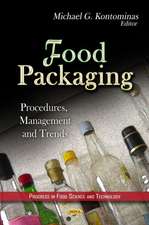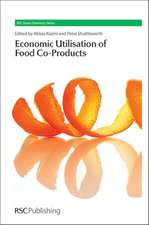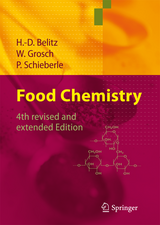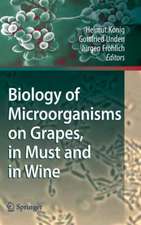Plant Proteins from European Crops: Food and Non-Food Applications
Editat de Jacques Gueguen, Yves Popineauen Limba Engleză Paperback – 2 oct 2013
Plant proteins are regarded as versatile, functional ingredients or as active biological compounds, and as essential nutrients in food. Besides food uses, plant proteins are also considered as "green" chemical molecules useful in manufacturing non-food industrial products. This new utilization of plant proteins presents a great challenge for agriculture and industry and will also be beneficial for the environment. In this book, numerous scientists working on all aspects of proteins from the major European crops report on the role played by plant proteins in food systems and their effects on human health. In addition, the most recent data on protein-based plastic materials and other non-food products are presented.
Preț: 947.85 lei
Preț vechi: 1155.91 lei
-18% Nou
Puncte Express: 1422
Preț estimativ în valută:
181.39€ • 196.97$ • 152.37£
181.39€ • 196.97$ • 152.37£
Carte tipărită la comandă
Livrare economică 22 aprilie-06 mai
Preluare comenzi: 021 569.72.76
Specificații
ISBN-13: 9783662037225
ISBN-10: 366203722X
Pagini: 368
Ilustrații: XXVI, 339 p. 59 illus.
Dimensiuni: 155 x 235 x 19 mm
Greutate: 0.51 kg
Ediția:Softcover reprint of the original 1st ed. 1998
Editura: Springer Berlin, Heidelberg
Colecția Springer
Locul publicării:Berlin, Heidelberg, Germany
ISBN-10: 366203722X
Pagini: 368
Ilustrații: XXVI, 339 p. 59 illus.
Dimensiuni: 155 x 235 x 19 mm
Greutate: 0.51 kg
Ediția:Softcover reprint of the original 1st ed. 1998
Editura: Springer Berlin, Heidelberg
Colecția Springer
Locul publicării:Berlin, Heidelberg, Germany
Public țintă
ResearchDescriere
Jointly published with INRA, Paris
Plant proteins are regarded as versatile, functional ingredients or as active biological compounds, and as essential nutrients in food. Besides food uses, plant proteins are also considered as "green" chemical molecules useful in manufacturing non-food industrial products. This new utilization of plant proteins presents a great challenge for agriculture and industry and will also be beneficial for the environment. In this book, numerous scientists working on all aspects of proteins from the major European crops report on the role played by plant proteins in food systems and their effects on human health. In addition, the most recent data on protein-based plastic materials and other non-food products are presented.
Plant proteins are regarded as versatile, functional ingredients or as active biological compounds, and as essential nutrients in food. Besides food uses, plant proteins are also considered as "green" chemical molecules useful in manufacturing non-food industrial products. This new utilization of plant proteins presents a great challenge for agriculture and industry and will also be beneficial for the environment. In this book, numerous scientists working on all aspects of proteins from the major European crops report on the role played by plant proteins in food systems and their effects on human health. In addition, the most recent data on protein-based plastic materials and other non-food products are presented.
Cuprins
Session 1 — Biochemistry, structure, molecular biology.- Globulins from Legume Seeds: Structure and Function during Storage and Reactivation.- Three-dimensional Structural Variations and Functional Implications in a-Amylases.- Molecular Interaction of the a-Amylase Inhibitor from Phaseolus vulgaris Seeds with Pig Pancreatic a-Amylase.- Protease Inhibitors from Pea Seeds: Biochemical Characteristics.- Primary Structure of 2S Albumins from Seeds of Lupinus albus and L. cosentinii.- Lipid-Transfer Protein (LTP) from wheat kernel possesses a weak, specific esterase-like activity towards short chain fatty acid esters.- The Tertiary Structure of Plant Peptide Hormone Systemin and the Mechanism of its Action.- The Organization and Expression of Pea Seed Lipoxygenase Genes; Implications for Off-flavor Production in Frozen Peas and Pea Protein Isolates.- Structural Studies on Wheat Thioredoxin h.- Molecular Analysis of low Mr Glutenin Genes in Triticum tauschii.- Expression of HMW Glutenin Genes in Transgenic Wheat and Tritordeum Plants.- Manipulation of Potato Tuber Protein Quality through Genetic Engineering.- Transgenic Narbon Yean (Vicia narbonensis L.): a Grain Legume with Improved Nutritional Composition.- Analysis of Low-Molecular-Weight Proteins and Peptides by Micellar Electrokinetic Capillary Chromatography.- Site-Directed Mutagenesis of Wheat 9 kDa Lipid Transfer Protein (LTP).- Production of Pea Seed Lipoxygenases in Escherichia coli.- Detection of Transglutaminase in Vicia faba Cotyledons.- Session 2 — Functionality, interactions, modifications.- Modifying the Interfacial Behavior and Functional Characteristics of Proteins.- Protein Composition and Physical Properties of Wheat Flour Doughs.- Conformational Studies of the Repetitive Sequences of HMW Subunits of Wheat Glutenin.- Heat-induced Gelation of Rapeseed Proteins: Implication of Electrostatic Effects.- 2S Sunflower Albumins: Functional Properties of Native and Modified Proteins.- Enzymatic and Non-Enzymatic Phosphorylation of Plant Storage Proteins.- Investigation of Peroxidase Catalyzed Cross-Linking of Proteins: Potentialities for a Limited Reticulation of Proteins.- Plant Protein Improvements by Maillard-Type-Protein-Polysaccharide Conjugation and Reconstitution of Peptides with Microbial Transglutaminase.- Usefulness of the Bead Model Algorithm SOLPRO for Modeling the Conformation of Seed Globulins.- Properties of Glutenin Subunits Hydrolyzed with an Acid Protease.- Enzymatic Phosphorylation of Seed Globulins: Comparison between Pea and Soybean.- Session 3 — Nutrition and health.- Quality and Utilization of Plant Proteins in Human Nutrition.- Nutritional Utilization of Chickpea (Cicer arietinum) Meal and Proteins by the Rat as Compared to Lactalbumin and Soybean.- The Influence of Malting on Nutritional Value and Cholesterol Lowering Capacity of Chickpeas in Rats.- Absorption and metabolic distribution of [15N]-Labeled Pea Nitrogen in Humans.- Immunoblotting of Ileal Digesta of Calves Fed Pea.- The Influence of Plant Lectins on Immune Response against other Dietary Proteins.- Serum Amino Acid Profile and Protein Utilization in Rats Fed on a Pea Protein Isolate.- Effect of Plant Proteins on Colonic Bacterial Fermentation and Pancreatic Proteases in Gnotobiotic Rats: Comparison with Animal Proteins.- Session 4 — Structure and interactions in food systems.- Contribution of Proteins to Food Structures.- Characterization of Foam-enriched Proteins Prepared from the Aqueous Phase of Dough.- Functionality of Puroindoline in Breadmaking.- Expression of Low-Molecular-Weight Glutenin Subunits from A-genome Wheat and their Functional Role in Dough.- The Gluten Complex Studied by Urea Denaturation and Red-ox Titration.- Influence of Denaturation on Pea Protein Emulsions.- Dynamics of Allergen Degradation in Food.- Session 5 — Technology of Protein Processing.- Achievements, Status and Challenges in Food Protein Processing.- Production of Plant Protein Isolates: Influence of Extraction and Precipitation Parameters on Overall Yield and Protein Concentration.- High-Quality Oils, Proteins and Bioactive Products for Food and Non-Food Purposes Based on Biorefining of Cruciferous Oilseed Crops.- Protein Recovery and Trypsin Inhibitor Removal from Aqueous Extracts of Soy Flour.- Fractionation of Gliadin Hydrolysates by Ultrafiltration.- Wheat Gluten Modification by Alkaline Treatment and Succinylation in a Semi-technical Process.- Application of a Torus Reactor to Chemical and Enzymatic Modifications of Plant Proteins.- Session 6 — Non Food Uses.- Protein Modification and Technical Applications.- Application of Plant Proteins as Thermoplastics.- Comparative Properties of Pea Protein and Wheat Gluten Films. Influence of Various Plasticizers and Aging.- Edible and/or Biodegradable Wheat Gluten Films and Coatings.- Development of Drug-delivery Systems from Vegetal Proteins: All-trans-retinoic Acid-loaded Gliadin Nanoparticles.- Modification of Wheat Gluten for Non-food Applications.
Caracteristici
Summarizes current knowledge of the use of plant proteins for food and non-food production (e.g. plastic production)
New methods of protein modification are examined as well as the possibilities of optimizing their functionality
Will be of particular interest to practitioners
New methods of protein modification are examined as well as the possibilities of optimizing their functionality
Will be of particular interest to practitioners
